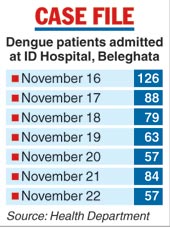
Calcutta: The temperature plunge on Wednesday has led public health experts to predict that the dengue outbreak will die out soon.
The Aedes aegypti mosquito that spreads dengue is known to breed less once the Celsius drops below 20 degrees, making wintry weather the most effective weapon against the scourge of the season.
Hospitals and clinics in the city have already reported a decline in the number of dengue cases over the past few days.
At the Infectious Diseases Hospital in Beleghata, which is Bengal's largest government-run facility of its kind, the number of inpatients with dengue had dropped from 126 on November 16 to 57 on November 20.
The number of inpatients suddenly rose to 84 on Tuesday, but dipped to 57 within 24 hours. "This fluctuation is likely to continue for a few days. Every year, when the dengue outbreak starts subsiding, there is some fluctuation before the number drops consistently," said Uchhal Bhadra, principal of the teaching hospital.
A private hospital off the Bypass had about 30 patients with dengue on Wednesday, but officials said no new patient with the virus had come in during the past three days.
Calcutta had received light to moderate rainfall for three days from November 15, raising fears about the dengue outbreak getting a fresh lease of life.
"During winter, the Aedes aegypti mosquito does not find new breeding sites because there is little rain, if at all," said Debashis Biswas, chief vector control officer in the Calcutta Municipal Corporation.
Rahul Jain, internal medicine specialist at Belle Vue Clinic, said the number of dengue patients he had seen in the past three days was around 50 per cent less than in the previous week.
While dengue seems to be on its way out, beware of a spurt in respiratory diseases.
"People tend to stay in rooms with doors and windows closed once the weather becomes cooler. Pollution levels go up in winter, so people are vulnerable to infections of the upper and lower respiratory tracts," Jain said.
Low temperature is also ideal for flu viruses, and they spread easily from one person to another by touch, coughing or sneezing. People with asthma, chronic obstructive pulmonary disease, heart ailments, diabetes and other conditions that compromise immunity are the most vulnerable, doctors said.










